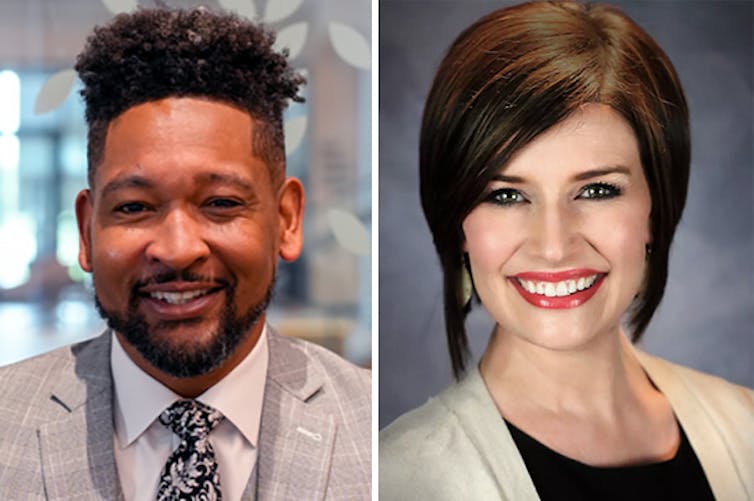If a school board member has a social media account, would it be wrong for them to block someone and delete their comments? That’s a question the Supreme Court has decided to take up after public officials, including two school board members, blocked constituents from seeing their accounts or removed critical comments.
At stake is what constitutes state action – or action taken in an official governmental capacity – on social media. Under the First Amendment, officials engaging in state action cannot restrict individuals’ freedom of speech and expression.
A ruling in the case, likely to come in spring or early summer 2024, could have broad implications for American society, where nearly three-fourths of the population use social media in their daily lives. The ruling could also establish whether social media accounts of public officials should be treated as personal or governmental.
In a joint oral argument, the Supreme Court heard two separate cases on the matter, including the one involving school board members, in late October 2023. Interestingly, lower courts reached opposite outcomes, prompting the question of whether a post on a personal social media page can be considered state action.
The school board case
Beginning around 2014, two school board candidates in the Poway Unified School District in San Diego created Facebook and Twitter, now X, pages as part of their campaigns for office. They continued to use them after they were elected to communicate with residents and seek their input.
In 2017, the school board members blocked a couple with children in the district from commenting on their pages. Christopher and Kimberly Garnier repeatedly posted criticism on those pages over such issues as the board members’ handling of race relations in the district and alleged financial wrongdoing by the then-superintendent. The Garniers responded to being blocked by filing a lawsuit.
In the resulting case, O'Connor-Ratcliff v. Garnier, the U.S. Court of Appeals for the 9th Circuit affirmed that the two school board members violated the Garniers’ First Amendment rights to free speech and expression. The court rejected the board members’ claims that their accounts were private because they were not controlled by their boards and their posts were not directly related to their official duties.

The 9th Circuit judges made three points in ruling that the board members violated the First Amendment. First, the pages identified the board members as government officials and displayed their titles prominently. Second, the social media accounts provided information about school activities. And third, the board members solicited constituent input about school matters on the social media pages in question.
However, the court concluded that the board members were not liable for monetary damages. This is because at the time the school board members blocked the Garniers, no court had yet established whether the First Amendment applies to public officials’ speech in the context of social media. It was – and remains – a new frontier in the law.
Critical comments over COVID-19
Conversely, in a similar case in Port Huron, Michigan, the 6th Circuit made the opposite ruling.
Years before he was appointed city manager in 2014, a man named James Freed created a personal Facebook page that he eventually made public when he reached the limit of “friends” allowed on Facebook. Once in office, he used the page for both personal and professional reasons, posting updates about his family as well as policies he was working to implement. During the pandemic, constituent Kevin Lindke posted on Freed’s page, criticizing his handling of the public health crisis. Freed deleted Lindke’s comments and blocked him from the page. Lindke sued.
In Lindke v. Freed, the 6th Circuit affirmed that Freed did not violate the First Amendment in deleting and blocking Lindke’s comments. And like the 9th Circuit in O'Connor-Ratcliff v. Garnier, the court concluded that people’s First Amendment rights to comment on public officials’ social media pages had not yet been established.
The 6th Circuit ruled that Freed posted on his social media page as a private citizen, rather than as a governmental official. The court determined this for three reasons. First, no state law required him to run a social media page. Second, state funds and resources were not used to run the page. And third, the page belonged to Freed as an individual, rather than to the office of city manager – unlike the @POTUS page on X, for example. Therefore, the court concluded that the postings did not constitute state action subject to the First Amendment.
In April 2023, the Supreme Court agreed to intervene in both cases.
The future of the cases
Both cases not only have consequences for citizens’ First Amendment rights but also for social media companies and users. The Court may decide whether social media platforms such as Facebook and X can be liable for allowing a public official to block private citizens from commenting on their accounts.
These cases might also establish rules and standards about how public officials can control their social media accounts and the role of the courts in these disputes.
In a brief supporting the city manager in Lindke v. Freed, the U.S. Department of Justice basically argued that if the government neither owns nor controls the personal social media accounts of public officials, their behavior on the platforms “will rarely be found to be state action.”
The DOJ added that preventing public officials from blocking some messages might make them less willing to speak out about important issues. They warned that this could reduce, rather than enhance, free speech and discourse on matters of public interest, whether in schools or other agencies.
On the other hand, organizations such as the ACLU argue that allowing public officials to restrict comments on social media would be detrimental to democracy by limiting free speech.
“The upshot of the government officials’ argument is that they should have a constitutional blank check to silence or retaliate against their constituents for expressing disfavored viewpoints on social media,” the ACLU wrote about the two cases. “This would give officials a way to short-circuit our most fundamental First Amendment protections.”
Depending on how the court rules, social media may be headed into a new era of who can access and comment on the accounts of public officials.

